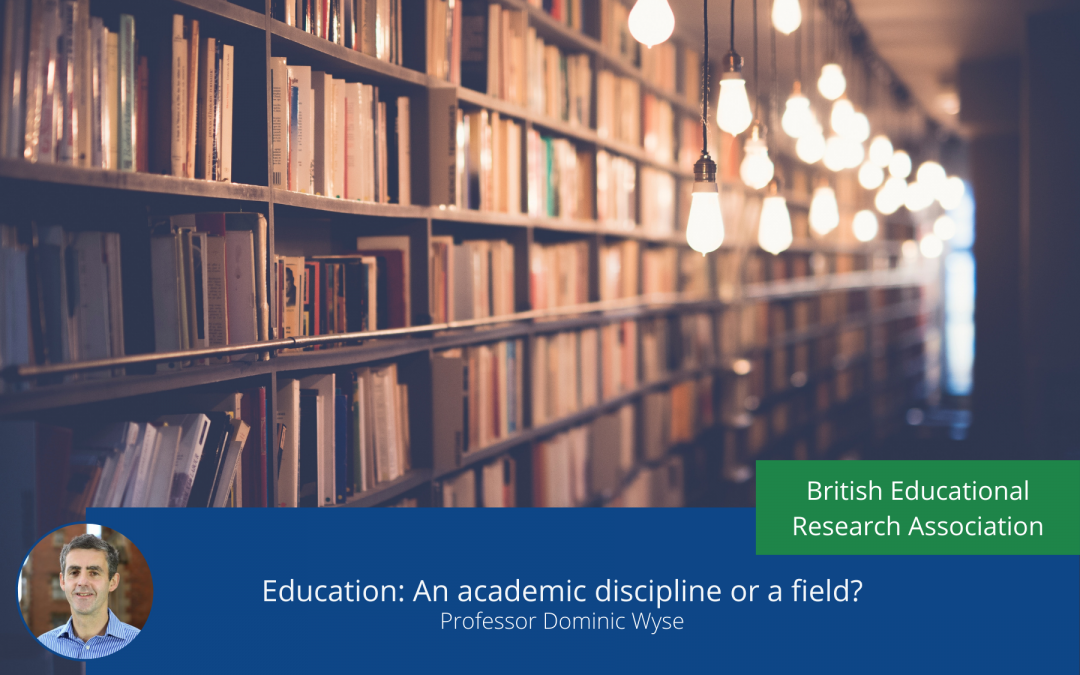What is the problem?
Education research has periodically been sharply criticised for being weak in comparison with research from other disciplines. Some of this criticism has implied, or suggested more directly, that one of the reasons for the perceived weakness in education research is that education is not a ‘proper’ academic discipline when compared to other disciplines. Some go as far as to define education as a ‘field’ or an ‘applied subject’. See Furlong, 2013 for an examination of education as a field versus a discipline; see Wyse, Selwyn, Smith and Suter, 2017, for an overview of the range of criticisms from researchers, practitioners and policymakers, that education research has been subject to.
Why does this matter?
Correctly categorising education matters because an area of knowledge described as a field is often seen as substandard compared to an area described as a discipline. For example, more than 20 years ago, Deem (1996, p.7) noted the effects of discrimination in her university sociology department that she attributed in part to the distinctions that were made between ‘theoretical sociology (regarded as high status … and a masculine preserve’), ‘empirical sociology’, and ‘applied sociology which was generally regarded as being of somewhat lower status, although essential for would-be social workers, and female-dominated’.
The debates in sociology about knowledge organisation can be seen mirrored in some debates in university education departments in the 21st century: for instance inequitable salaries; the place of teacher education/training in relation to academics being ‘research active’; lecturer identity and promotion at work; and theories of education as an area of knowledge (for a European perspective on categorising education see Whitty & Furlong, 2017).
The depiction and definition of education as a discipline versus a field also matters because people value accuracy and correctness in relation to any area of knowledge.
Six criteria for judging whether an area of knowledge might be called a discipline were presented in a working paper from the UK’s ESRC National Centre for Research Methods (Krishnan, 2009). The most important of these was that ‘disciplines must have some institutional manifestation in the form of subjects taught at universities or colleges, respective academic departments and professional associations connected to it.’
Education not only clearly meets this criterion but also, in my view, the other five of Krishan’s criteria:
- A particular object, or focus, for its research
- A body of accumulated specialist knowledge specific to the discipline
- Theories that organise the specialist knowledge
- Specific terminologies
- Specific research methods.
I am not suggesting that there is universal agreement on the manifestation of these criteria in education, but that sufficient evidence exists to depict education as an academic discipline.
What should be done?
We are approaching the final dates for all university submissions, for all academic disciplines, to the UK’s Research Excellence Framework (REF). The most important outcome of the REF judgement of research quality in the UK will be the dividing of a substantial stream of UK government research funding, by university and by discipline, for what is likely to be at least five years. In other words, there will be institutional and discipline ‘winners and losers’. This allocation will have implications for all disciplines, for example, their capacity to maintain research capacity including people’s research careers. But another important outcome is the REF’s data, analyses and reporting on research outputs and research environment that can be seen as a measure of the state of academic disciplines, beginning in the REF panel reports with how each discipline is defined and described.
On the basis of the kind of work cited in this blog (and previous work cited in Wyse, 2020, and cited in Wyse, Brown, Oliver, & Pobleté, 2020) it is in my view essential that any REF description of education,[1] and any institutional submission for a department of education, clearly portrays education as an academic discipline rather than a field. While there are strategic benefits that arise from the description of some education work as social science, defining education as a field is likely to have a negative impact which risks damage to the future progress of education as an academic discipline in universities, and possibly as a force for good in wider society. Surely a risk not worth taking.
This blog draws on the articles ‘Education research and educational practice: The qualities of a close relationship’ by Dominic Wyse, Chris Brown, Sandy Oliver and Ximena Pobleté, and ‘Presidential address: The academic discipline of education: Reciprocal relationships between practical knowledge and academic knowledge’ by Dominic Wyse.
Both are published in the British Educational Research Journal, and have been made free-to-view, for a limited period, for those without a subscription, courtesy of the publisher, Wiley.
A video of the latter presidential address, at the BERA Annual Conference 2019, is available here.

Professor Dominic Wyse
Professor of Early Childhood and Primary Education at the University College London (UCL) Institute of Education (IOE)
Dominic is current President of the British Educational Research Association (BERA) from 2019 to 2021. He is a fellow of the Academy of Social Sciences (FAcSS), and of the Royal Society for the encouragement of Arts, Manufactures and Commerce (RSA).
Prior to his role at the IOE as Head of Academic Department Learning and Leadership Dominic was Faculty Director of Research, Consultancy and Knowledge Transfer, in the Faculty of Children and Learning. Dominic has significant experience in music that began with his undergraduate studies at The Royal Academy of Music.
Before joining the IOE Dominic was a Senior Lecturer at the University of Cambridge. He was also appointed as the first Director of Music-Making at Churchill College Cambridge, where he was a Fellow and Director of Studies for Education. In the past Dominic was a Reader at Liverpool John Moores University, and a teacher with experience working in London, Bradford and Huddersfield in infant and junior phases.
References
Deem, R. (2006). Border territories: A journey through sociology, education and women’s studies. British Journal of Sociology of Education, 17, 5–19.
Furlong, J. (2013). Education – An anatomy of the discipline: Rescuing the university project? London: Routledge.
Krishnan, A. (2009). What are academic disciplines? Some observations on the disciplinarity vs. interdisciplinarity debate. NCRM Working Paper Series.
Whitty, G., & Furlong, J. (2017). Knowledge traditions in the study of education. In G. Whitty & J. Furlong (Eds.), Knowledge and the study of education: An international exploration (pp. 13–57).
Wyse, D. (2020). Presidential address: The academic discipline of education. Reciprocal relationships between practical knowledge and academic knowledge. British Educational Research Journal, 46(1), 6–25. https://doi.org/10.1002/berj.3597
Wyse, D., Brown, C., Oliver, S., & Pobleté, X. (2020). Education research and educational practice: The qualities of a close relationship. British Educational Research Journal. https://doi.org/10.1002/berj.3626
Wyse, D., Smith, E., Selwyn, N. & Suter, L. (2017). Editor’s Introduction. In D. Wyse, E. Smith, N. Selwyn & L. Suter (Eds.) The BERA/SAGE Handbook of Educational Research. London: Sage.
[1] Or equivalent process in countries outside the UK.

